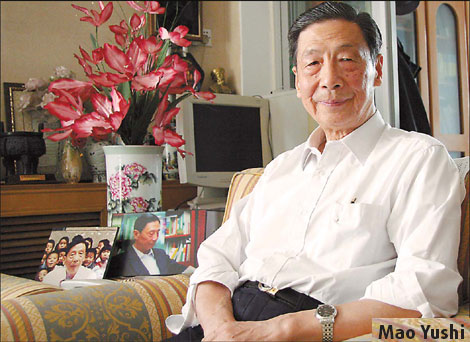


Known as China's Muhammad Yunus, the 2006 Nobel Laureate who initiated the microfinance concept, Mao Yushi, a 79-year-old economist, has been granting small loans to the rural poor for 15 years.
In 1993, Mao and a few friends set up a fund in Longshuitou village in North China's Shanxi province with several hundred yuan of their own savings. Since then the fund, which lends money to locals with no collateral, has expanded to two other nearby villages and now has 1.3 million yuan under management.
Contrary to the notion that the risk of small loans is high, Mao found that given proper management, his poor borrowers are as credible as big enterprises, if not more so. With seven part-time village employees overseeing the fund, Mao managed to keep its bad loan ratio below 4 percent, compared with the 6.17 percent average for local banks in 2007.
Mao thinks the nation's microfinance sector still has a long way to go. He talks with China Business Weekly reporter Wang Xu about his experiences with microcredit and his suggestions for its development.
Q: What's the current situation with your micro loans fund in Longshuitou?
A: We now have 1.3 million yuan in the fund, 400,000 yuan of which is from donations and operating profits. The rest are deposits. We are considering expanding the program to two other villages this year, besides the three existing ones.
All our loans are made to the residents native to the three villages. Rather than aiming to make a profit, we try to use the loans to alleviate poverty and help boost the local economy. Our loan scale is between 5,000 and 10,000 yuan. Over the past 10 years, our bad loan ratio was lower than 4 percent. For small loans, that's not bad. We now have seven villagers for the daily management of the funds, which is the key for risk control. Only the natives can know which borrowers are trustworthy and have the capability to pay back the money.
Q: Do you think your trial has been successful?
A: It depends on the criteria. It is a success in the sense that the fund has survived for 15 years and is still functioning well. But compared with the demand of the rural area, our progress is very slow. And even now, we haven't been able to register as a financial institute or non-profit organization, largely due to regulatory obstacles.
Q: What are the key obstacles for the development of the microcredit sector in China?
A: Regulatory hurdles are still posing difficulties for the development of small-loan institutions. So far, there are no specific regulations in regards to rural microcredit organizations. But there are already several hundred microcredit funds like us in the nation, largely inspired by the deeds of Bangladesh's Muhammad Yunus, who won the 2006 Nobel Peace Prize for initiating the microcredit movement.
Q: So strictly speaking, micro loan funds are still illegal in China?
A: They are not illegal, but also not legal. This is the typical pattern of China's reform. There are novel things that are good but contradict existing rules. So the government has taken a laissez faire attitude towards their development, while observing the impact and considering possible adjustments of existing rules or laws. Presently, the China Banking Regulatory Commission still hasn't worked out a proper regulatory framework for microfinance. If they apply the current regulatory methods for large banks to small-loan organizations, the cost will be too high.
My advice is for the government to allow the establishment of a handful of auditing firms to monitor the operation of micro companies. So instead of inspecting all the loan organizations, the authorities could only oversee the auditing firms.
Q: You mentioned earlier that microcredit organizations should be allowed to accept deposits for sustainable growth. But in recent years, a lot of fraud associated with underground banks has been uncovered. So what's your suggestion for protecting the interests of depositors?
A: We could take a step-by-step approach. In the first few years, small-loan firms would only be allowed to use their own capital to conduct lending business. After four or five years, when they have proven their credibility, the government could then allow them to take deposits.
Q: Over the past year, there have been some trials in the area of microfinance. Some foreign banks have set up branches in the countryside and Zhejiang province is testing a pilot project to set up small-scale loan firms. How do you think these efforts will benefit the rural areas?
A: These trials will definitely benefit the rural areas. However, the target clients of these loan firms or banks are entrepreneurs in the countryside, rather than ordinary rural residents. There are some substantial differences between those organizations and the funds like ours.
For one thing, the risk of lending to entrepreneurs is much higher than lending to individual rural families. And banks need professionals that can evaluate the business prospects of the enterprises. But for small loans targeting ordinary rural residents, the best manager is the borrower's neighbor who knows him or her personally. The current trials are not designed to address the daily credit demand of ordinary rural residents.
Q: Do you think it's time for China to encourage the development of the microfinance sector?
A: We should have started doing so a long time ago. In fact, our condition is better than Bangladesh as China's rural economy is more developed. And there is abundant capital, which is why you have seen an increasing number of underground banks in recent years.
(China Daily 10/06/2008 page3)













